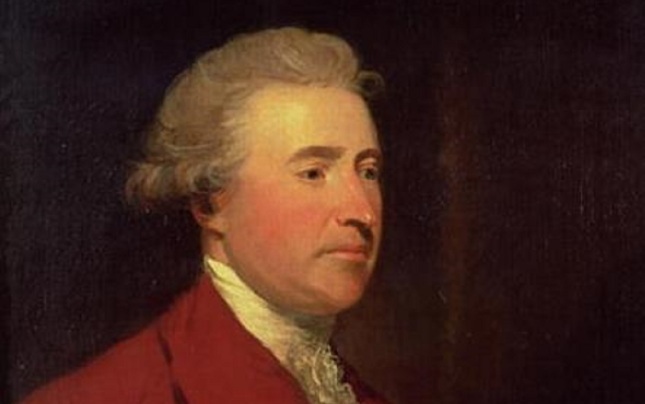
He may, or indeed he may not, have uttered the immortal phrase ‘The only thing necessary for the triumph of evil is for good men to do nothing’. He was a supporter of the American Revolution, and a horrified observer and opponent of the subsequent and extraordinarily bloody, French equivalent. He, and his father, were Anglican, although his mother and sister were Roman Catholic. In addition to which he was one of the greatest English statesmen of the eighteenth century. Except, as in many other instances, Edmund Burke was not English, but Irish.
He was born in Dublin in 1729, was educated at a Quaker school, and at Trinity College. In 1765 he was elected to the House of Commons for the constituency of Wendover, an infamous ‘pocket borough’ of barely one hundred voters, so-called because its representation—and it returned two MPs, not one—was in the pocket of Lord Fermanagh. By 1774, however, he had transferred to the constituency of Bristol where he actually had to fight genuine elections. But his advocacy of free trade with Ireland, and Catholic Emancipation, was not to the liking of the voters in the city at the centre of the British slave trade, and from 1780 onwards he was back in a pocket again, in the borough of Malton.
Burke quickly identified himself with the struggle of the American colonists, and the curtailment of the powers of the King at home. He also became part of a social circle that included the great lexicographer Samuel Johnson, the impecunious Irish playwright Oliver Goldsmith, the actor-manager David Garrick, and the artist Joshua Reynolds.
Initially he kept his powder dry when it came to the French Revolution, but as the rule of the guillotine took hold he wrote of revolutionary France that ‘the elements which compose human society seem all to be dissolved, and a world of monsters [is] produced in the place of it’. In his famous Reflections on the Revolution in France, published in November 1790, Burke had a go, not only at the event itself but at its radical British supporters. He also made a few pounds in the process, as the pamphlet went on sale for five shillings, and sold almost twenty thousand copies.
Many have said that Burke’s finest hour was his very personal campaign to impeach the chief factotum of the infamous East India Company, Warren Hastings. Except that it was a bit more than an hour. Burke’s opening speech in the trial of Hastings took four days. His response to the defence case took a further nine days. Hastings was accused of corruption as Governor General of India, and of having enriched himself during his tenure there. One previous high profile impeachment had been that of the great servant of King Charles 1 in Ireland, Thomas Wentworth, Earl of Stafford. Despite the fact that it failed to impeach, Parliament found a way to execute Stafford anyway. Not that anyone was suggesting that Hastings should face the chop.
The entire procedure, which was in part a political trial designed by the Whigs to embarrass the ruling Tories, began in 1788 and didn’t end until 1795. The whole thing cost Hastings £70,000—which, according to a Bank of England inflation calculator, would be worth £8.5 million today. It all sounds very Tribunal-ish, doesn’t it.
Burke is seen by many historians as the father of English conservatism, but his opposition to British imperialism in Ireland, and India, often meant that he fell foul of the leading Tories of his day. He had lots of enemies, many of whom exploited his Irishness, and the suspicion that he was really a Roman Catholic all along, against him. One contemporary cartoon has Burke peeling a potato while sitting beside a chamber-pot claimed to be a true relic of St. Peter.
Burke, by the way, is also credited with being the first to observe that ‘those who don’t know history are doomed to repeat it.’ And, indeed, a lot of people have done both, ignored history and repeated Burke’s famous axiom.
Edmund Burke, statesman, writer, orator and philosopher was born two hundred and eighty-nine years ago, on this day

You must be logged in to post a comment.